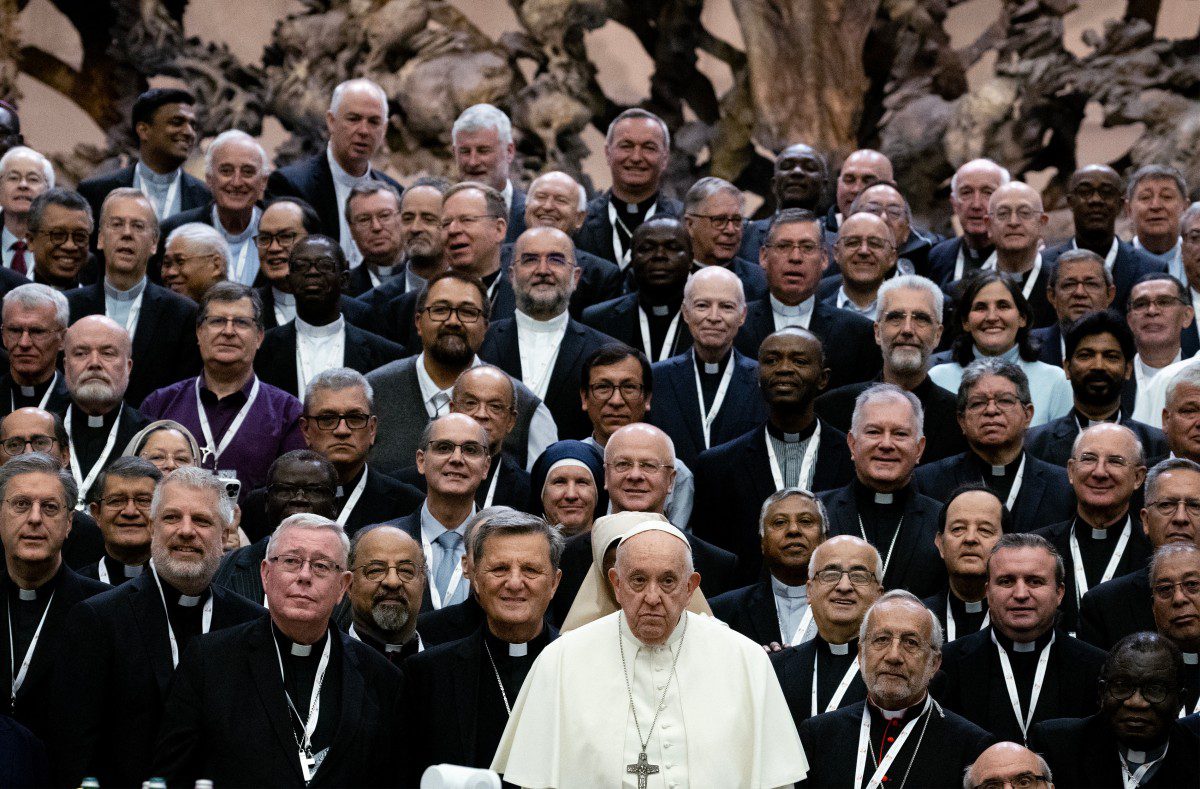
Pope Francis poses for a photograph with the participants of the Synod of Bishops at the Paul VI Hall in the Vatican on October 23, 2023.
Photo: Tiziana Fabi / AFP
The much-hyped “Synod on Synodality” conference in the Vatican ended last weekend, but despite concerns it could usher in a radically liberal view for the future of the Catholic Church, many liberals and LGBT activists expressed severe disappointment in the results.
The Vatican released a 42-page summary report on the Synod entitled “A Synodal Church in Mission,” which outlines the result of the Synod on Synodality. The document dropped any mention of the term ‘LGBTQ+’ much to the annoyance of liberals within the church.
One of the most well-known pro-LGBT priests in the Church, Father James Martin SJ, wrote an op-ed on the synod for the Jesuit magazine America, in which he said:
Still, the lack of any mention of the term “L.G.B.T.Q.” in the final synthesis … was, for many people, including myself, a disappointment.
Father Martin claimed that during the synod there were two approaches to the topic of same-sex attracted Catholics. His own, which involves calling on the Church to do more to “reach out” to these people, and the more traditional approach, which condemns LGBT ideology as being “foisted upon countries by the West or a form of ‘neo-colonialism,’ and focusing more on homosexual acts as ‘intrinsically evil.’”
However, one major figure within the Church who has used the term “neo-colonialism” to describe transgender ideology has been Pope Francis himself.
Earlier this year, the pope gave an interview stating, “Gender ideology, today, is one of the most dangerous ideological colonizations,” and went on to add, “Why is it dangerous? Because it blurs differences and the value of men and women.”
While the go-ahead to bless same-sex unions was not given approval by the Synod on Synodality, some priests in Europe and elsewhere have taken to giving them regardless, notably in Cologne, where they do so even in opposition to their archbishop, Cardinal Rainer Woelki.
The Synod on Synodality did, however, leave the door open for other controversial changes, such as allowing women to become deacons. Although the document took no clear position on the issue, it did say that “theological and pastoral research on women’s access to the diaconate should be continued.”
Some have argued that creating women deacons would be the natural first step to the ordination of female priests, or priestesses, something that the German Synodal Path approved of earlier this year.
Pope Francis has attempted to dispel such concerns by previously stating that it was impossible for women to become priests.
“The fact that the woman does not access ministerial life is not a deprivation, because her place is much more important,” Pope Francis said. He also pushed back on arguments that having women priests could bring more people to the church.
“Lutherans ordain women, but still few people go to church,” he said, adding, “Their priests can marry, but despite that, they can’t grow the number of ministers. The problem is cultural. We should not be naive and think that programmatic changes will bring us the solution.”
Irme Stetter-Karp, President of the ultra-liberal Central Committee of German Catholics (ZdK), is one of the advocates for women priests, arguing:
The stubborn adherence to the dual anthropology and the confinement of women to the space outside of the ordained ministry tends to drive women, especially young women, out of the Church in the 21st century.
While Stetter-Karp is seen as a supporter of “inclusivity” within the Church, she also stated earlier this year that members of the populist Alternative for Germany (AfD) should be banned from lay positions within the Catholic Church in Germany.
The most radical proposal of the Synod on Synodality was a call to expand the role of synodal assemblies within the Church and be canonically recognized.
The Synod on Synodality is unique in that it features bishops and other clergy as well as lay people as part of its decision-making. The synod itself, however, has no power to change canon law and acts more as an advisory body to the pope.
The 2023 Synod document also states that it is not a finalised document and will simply be the basis for another Synod on Synodality meeting in October 2024, which is expected to finalise recommendations for the pope.
Cardinal Jean-Claude Hollerich, an arch-liberal who serves as relator general of the Synod on Synodality, said he hoped the document released this year would be a “step of a Church on the move” and that more solid proposals would be made in next year’s final document.
